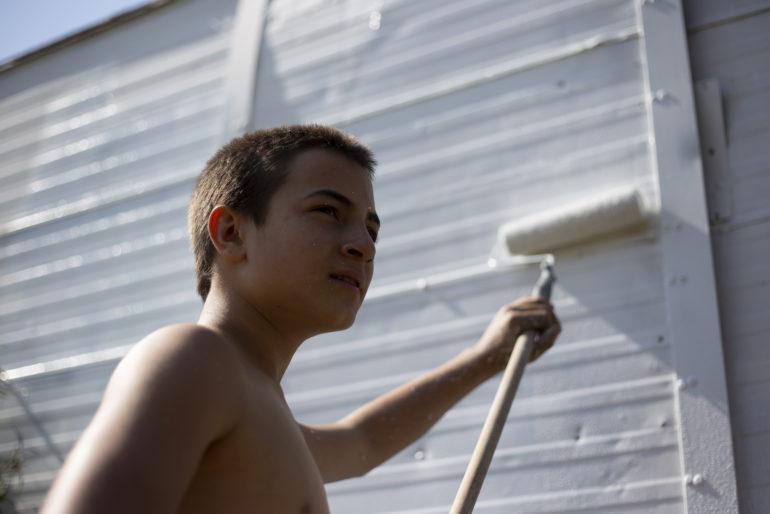Los Cabos Pix-in-Post Draw Picture of a Troubled Mexican Nation
By John Hopewell
LOS ANGELES (Variety.com) – MEXICO CITY — A portrait of age-old custom (“Gods of Mexico”), a troubled mother-son relationship (“Summer White”) and three film which came in at Mexico’s heart of darkness – its violence – from different angles, shape a Work in Progress section at this year’s Los Cabos which could hardly be more concerned about the current state of Mexico. Following brief profiles of the five titles:
‘THINGS WE DARE NOT DO’
The second feature from Bruno Santamaría Razo whose debut “Margarita” won a Mezcal Prize special mention at the 2016 Guadalajara Festival. Set on the borderland between documentary and fiction, “Things We Dare Not Do” turns on a simple premise: in a benighted village on marshy plains, where access to running water is occasional, celebrated as Tap Day, Noño, the eldest son and second father to a swarm of siblings, prepares to tell his mother he’s gay. Meanwhile, two men are shot dead at a local dance, in front of children. Noño’s coming out is all the more courageous given such a context of machismo and ingrained homophobia. “I feel a very big need to talk about what we loose when violence arises, how it was before the consequences of violence; about life, love, games and important decisions that change our life,” Santamaría Razo has said.
‘SUMMER WHITE’
The latest offering from the Opera Prima program at Mexico’s prestigious CCC film school which is sparking good word-of.mouth as a shrewdly observed psychological drama, which has just been selected for Ventana Sur’s Copia Final in early December. Laced with autobiographical elements, Rodrigo Ruíz Patterson’s debut weighs in as a traumatic coming of age movie, painting a portrait of fragile emotional dependence and pained rebellion of a single son of a single mother who reacts with growing hostility to her new boyfriend moving into their home. Film’s producer is Alejandro Cortés Patterson, a production manager on Rodrigo Pla’s “A Monster with A Thousand Heads,” Seasons 2 and 3 of Netflix’s “The House of Flowers” and Fox Premium’s “Sitiados.”
‘FLORA Y FAUNA’
The ninth fiction feature from Nicolas Pereda (“Perpetuum Mobile”) who from 2007 to 2015 made one a year, “Flora and Fauna” comments on how narco gang violence has eviscerated Mexico, its society and its imagination. In the larger frame narrative, estranged offspring Luisa and Gabino revisit their parents in a ghost village. Their father’s only interest in them is sparked by Luisa’s actor boyfriend when he acts out the role of narco kingpin. In the acerbic inset, played by the same actors, a man arrives at a hotel looking for a lost friend, becomes embroiled with the sister of the girl who’s going out with the thuggish son of the local kingpin. The man’s life becomes a nightmare, the gross brutish blind he suffers contrasting with the glamor of narco fiction.
‘NUDO MIXTECO’
Few indigenous filmmakers have Angeles Cruz’s fame, or balls. Produced by Lola Ovando and Lucia Carreras, a distinguished filmmaker in her own right (“Missing Dad,” “Tamara and the Ladybug,” starring Cruz), “Nudo Mixteco” chronicles three stories, sparked by three characters return to their Mixteco home village. As Cruz told Variety at San Sebastian, the film enrolls elements from her indigenous culture, such as its circular narrative, with each of the three parts overlapping at one point. What gives the film its edge, however, is the robust feminist gaze with which it chronicles three cases of gender abuse in the village. A celebration of Mixteco culture does not require hagiography.
‘GODS OF MEXICO’
Directed by Helmut Dosantos, “Gods of Mexico” features an extraordinary collage of rural scenes, immaculately composed and shot in color and black-and-white, capturing millennial rites – a Devil’s Dance, for example – work practices, salt pans and a furnace, which have not changed in centuries; and rural workers, staring at the camera in mid-shot or close-up, their furrowed faces testaments to a large segment of humanity far from the cosmopolitan globalizing world, as one episode title observes.



